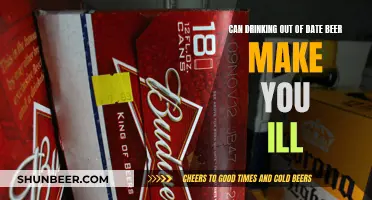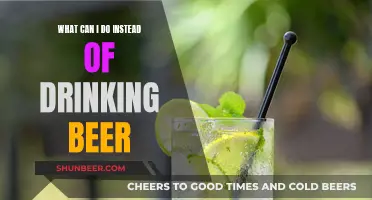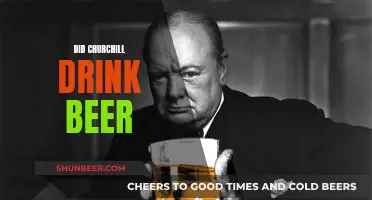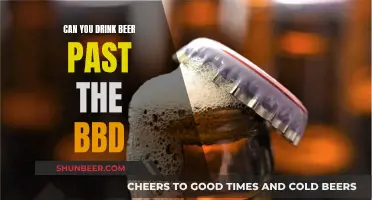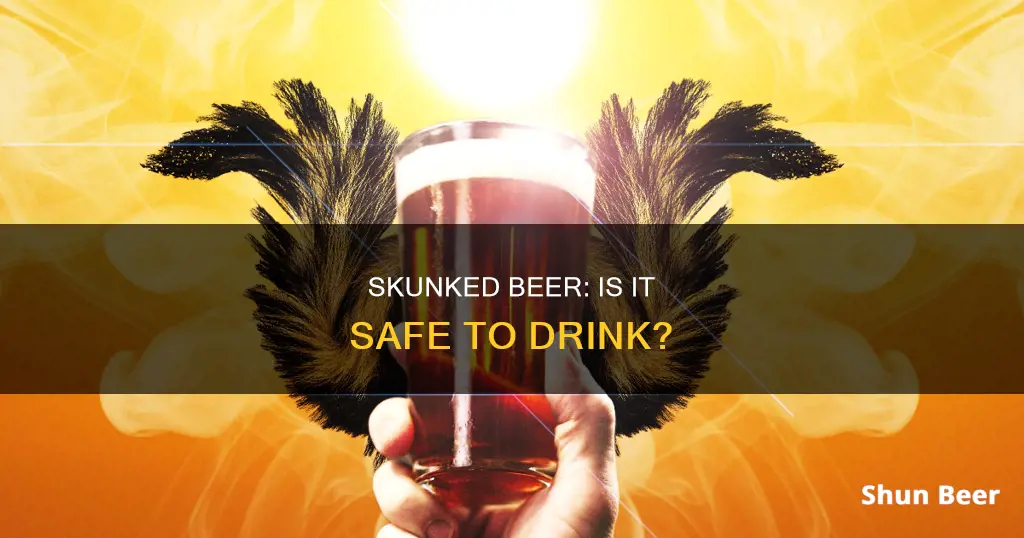
Skunked beer is a result of a chemical reaction that occurs when beer is exposed to ultraviolet or artificial light. This exposure leads to the creation of a compound, 3-methyl-2-butene-1-thiol (MBT), which gives the beer a skunk-like taste and smell. While skunked beer is unpleasant, is it safe to drink? Can drinking skunked beer make you sick, or is it simply an issue of bad taste? This question has sparked discussions among beer enthusiasts, with some sharing their experiences of stomach problems after consuming potentially skunked beer.
| Characteristics | Values |
|---|---|
| Can drinking skunked beer make you sick? | No, it's not known to cause sickness. |
| What causes beer to become skunked? | Exposure to UV or artificial light over a long period of time. |
| What does skunked beer taste/smell like? | A skunk's spray, burnt rubber, a musty basement, or wet cardboard. |
| What type of beer is most susceptible to skunking? | Bottled beer, especially those in clear glass bottles. |
| How to prevent skunking? | Store beer in a dark and cold place, away from direct sunlight. |
What You'll Learn

Skunked beer is not poisonous and won't make you sick
Skunked beer occurs when a light source penetrates the glass container of beer over a long period of time. This causes a chemical reaction in the beer's ingredients: hops, yeast, grain, and water. Hops contain alpha acids, which are very sensitive to light. When these acids break down, they react with the sulfur content in the beer, producing a compound known as 3-methyl-2-butene-1-thiol (MBT), which smells like a skunk's spray.
Despite this chemical reaction taking place, drinking skunked beer will not make you ill. While it may be unpleasant, there has never been a foodborne illness associated with drinking an unadulterated beer. In fact, beer has long been considered resistant to becoming infected or spoiled.
However, it is important to note that drinking multiple skunked beers in a short period may lead to negative side effects, but this is due to inebriation and intoxication rather than any spoilage of the beer.
To avoid skunked beer, consider purchasing canned beer, as aluminum cans effectively block out light. If you prefer bottled beer, ensure that it is not displayed or stored in direct sunlight, and store it in a dark, cold place or the fridge as soon as possible.
Beer and Diabetes: What Diabetics Need to Know
You may want to see also

It's caused by a chemical reaction when beer is exposed to UV light
It's important to clarify that, while unpleasant, drinking skunked beer will not make you sick. The phenomenon of skunked beer is caused by a chemical reaction when beer is exposed to light, specifically UV light. This is why it's important to store beer in a cool, dark place away from direct sunlight.
When beer is exposed to UV light, it can undergo a chemical reaction known as "skunking" or becoming "light-struck". This occurs when the hops in the beer, which are light-sensitive, break down and release a chemical compound called 3-methyl-2-butene-1-thiol. This compound is also found in skunk spray, hence the name "skunked" beer. The process is similar to how a laser can break down the compounds responsible for hops' light sensitivity, as discovered by chemists from the University of North Carolina at Chapel Hill in 2001.
The light wavelengths that cause beer to skunk fall between about 350 and 500 nanometers. Light with wavelengths of 350 nm is in the upper end of the ultraviolet range and is invisible to the human eye, while light with wavelengths of 500 nm is in the visible range. These wavelengths are associated with purple, blue, and green colours. Sunlight is the primary cause of skunking in beer, but LED and fluorescent lights can also contribute to the process.
To prevent skunking, beer is often stored in brown or green glass bottles, as these darker colours help filter out the light. Aluminum cans and kegs are also effective at blocking out light completely. Additionally, choosing a beer packaged in cans can help, as cans are opaque and more airtight than bottles.
In summary, while drinking skunked beer will not make you sick, it is the result of a chemical reaction caused by exposure to UV light. This reaction can be prevented by storing beer in cool, dark places and choosing packaging that blocks out light, such as cans or dark bottles.
Heart Monitor and Beer: Is It Safe?
You may want to see also

It's more common in bottled beer than canned beer
Skunked beer is a term used to refer to beer that has been compromised by exposure to UV rays from sunlight or artificial light. The technical term for this process is "lightstruck". The exposure to UV rays causes a chemical reaction in the beer, which affects its flavour. This process does not pose any health risks, but it does result in an unpleasant taste and smell. Skunked beer is often described as having a skunk-like odour, as well as smelling like burnt rubber, a musty basement, or wet cardboard.
Now, why is skunked beer more common in bottled beer than canned beer? Well, it comes down to the way that UV rays interact with the beer container. UV rays can penetrate glass bottles, allowing the light to reach the beer inside. On the other hand, aluminium cans effectively block out the light, preventing the chemical reaction that leads to skunking. So, the type of container used plays a crucial role in whether beer becomes skunked.
The colour of the glass bottle also makes a difference. Brown bottles provide the best protection against UV rays, with green bottles being more susceptible, and clear glass bottles being the most vulnerable to skunking. This is because different colours of glass have varying abilities to block out light of specific wavelengths. Brown bottles can block light under 500nm in wavelength, while green glass can only block light under 400nm, and clear glass offers minimal protection.
Brewers who choose to use clear bottles may use tetra-hops, which are a form of hop extract or inactive hops that are resistant to light. Additionally, it's important to note that proper storage can also help prevent skunking. Keeping bottles out of direct sunlight and storing them in a dark, cold place or the fridge can help reduce the chances of skunking.
In summary, skunked beer is more common in bottled beer than canned beer due to the UV light-blocking properties of aluminium cans. The colour of the glass bottle also plays a role, with brown bottles offering the best protection against skunking. Proper storage practices can further reduce the likelihood of skunked beer.
Pregnant Women and Root Beer: Is It Safe?
You may want to see also

It's safe to drink, but it won't taste very nice
Skunked beer is caused by a chemical reaction that occurs when a beer is exposed to direct sunlight or artificial light over a long period of time. This process is known as "lightstruck" beer and results in an off-putting taste and smell. Despite the unappetizing flavour, it is safe to drink skunked beer and it won't make you sick.
The main ingredients in beer are hops, yeast, grain and water. Hops contain alpha acids, which are very sensitive to light. When exposed to UV rays, these acids break down and react with the sulfur content in the beer. This creates a compound called 3-methyl-2-butene-1-thiol (MBT), which gives the beer a strong, skunk-like odour and taste.
Our taste buds are highly sensitive to sulfur compounds, so even a small amount of sunlight can ruin a beer. Skunked beer may also smell like burnt rubber, a musty basement, or wet cardboard. While it's safe to consume, the taste is certainly not pleasant.
To avoid skunked beer, opt for canned beer over bottled, as aluminium cans effectively block out light. If you prefer bottled beer, choose brown or green bottles, as these shades slow down the skunking process by blocking out certain wavelengths of light. Clear bottles are the least effective at blocking UV rays and are more likely to result in skunked beer.
If you do end up with a skunked beer, it's safe to drink, but be prepared for an unpleasant taste experience.
Beer and Diabetes: What Diabetics Need to Know
You may want to see also

Prevent it by storing beer in a dark, cool place
Skunked beer is caused by exposure to UV rays or, more specifically, a photochemical reaction involving blue spectrum and ultraviolet light in sunshine. This light causes a reaction deep inside the beer at the molecular level, affecting the hop oils. The result is the creation of a compound called 3-MBT, which gives off a skunk-like flavour and aroma.
To prevent your beer from getting skunked, it's important to store it in a dark, cool place. Keep your beer in a dark place, out of direct sunlight, and avoid clear or green glass bottles, as these are the most susceptible to letting in UV rays. Instead, opt for aluminium cans or brown bottles, which do a better job of blocking out light. Even brown glass bottles can let in enough light over time to skunk your beer, so it's crucial to keep them away from light sources and store them in a cool, dark place, like a cellar or a cupboard.
While heat and temperature changes don't directly cause skunking, they can increase the rate of oxidation, making your beer taste stale or cardboard-like. So, keeping your beer in a cool, temperature-controlled environment is essential to maintaining its freshness and preventing any off-flavours.
By following these storage guidelines, you can help ensure that your beer stays fresh and tasty, reducing the risk of it becoming skunked and unpleasant to drink.
Beer and Weight Loss: Is It Possible to Have Both?
You may want to see also
Frequently asked questions
Drinking skunked beer will not make you sick. While it might taste bitter and a bit sulfuric, it is not unsafe to drink.
Skunked beer occurs when a light source penetrates the glass container of beer over a long period of time. The beer undergoes a chemical reaction when exposed to ultraviolet or artificial light, resulting in a skunk-like taste and smell.
Skunked beer may taste bitter and a bit sulfuric. It may also smell like burnt rubber, a musty basement, or wet cardboard.
To prevent beer from getting skunked, avoid direct sunlight and store it in a dark, cold place or the fridge. If you're drinking outside, use a cooler with a lid.
Beers packaged in clear glass bottles, such as Miller High Life and Corona, are among the most skunked beers due to their lack of protection from ultraviolet light.


